Insight into North Korea: A view from behind the DMZ
Katharina Zellweger, Pantech Fellow in Korean Studies at Stanford University
Photos | Transcript
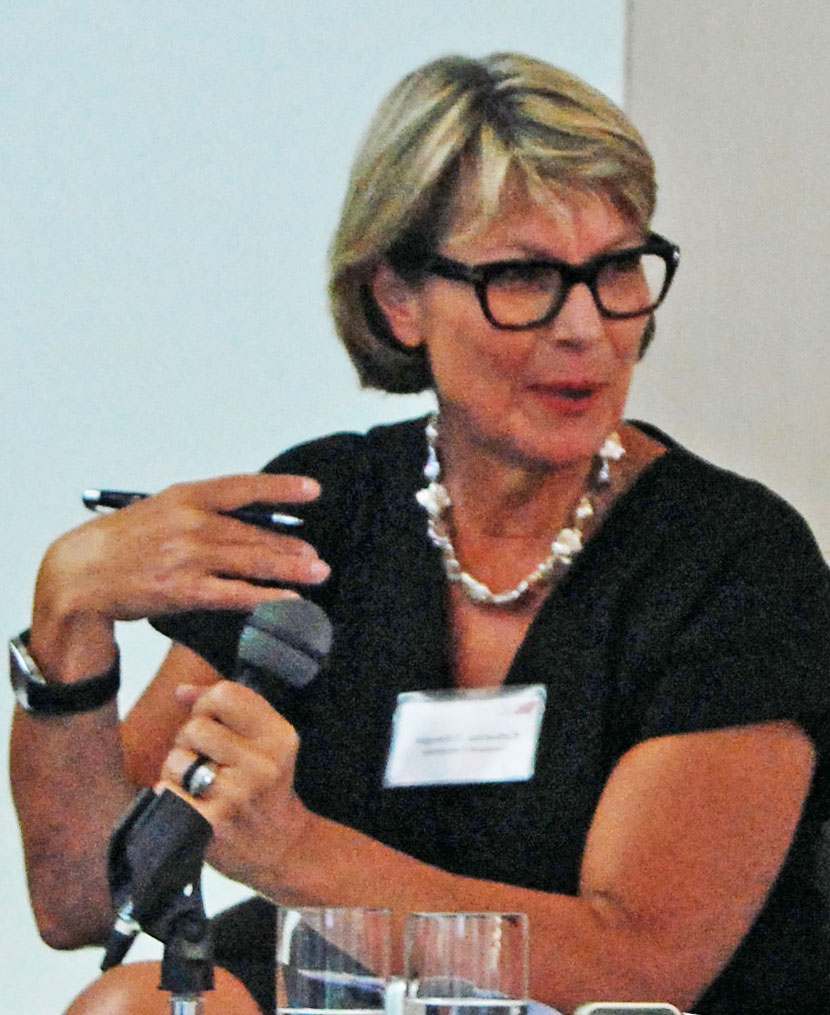 Washington, DC—On July 18, 2012, Katharina Zellweger, Pantech Fellow in Korean Studies at Stanford University and former North Korea Country Director for the Swiss Agency for Development and Cooperation, addressed WFPG on "Insight into North Korea: A View from Behind the DMZ" at a Beyond the Headlines event moderated by WFPG President Patricia Ellis. Zellweger spoke about the Democratic People's Republic of Korea following Kim Jong-Il's death, the food situation and need for humanitarian aid and development cooperation, and her assessment of the changes within North Korean society under Kim Jong-Un. The program was held at the residence of Swiss Ambassador Manuel Sager, and DCM Guillaume Scheurer gave opening remarks. Washington, DC—On July 18, 2012, Katharina Zellweger, Pantech Fellow in Korean Studies at Stanford University and former North Korea Country Director for the Swiss Agency for Development and Cooperation, addressed WFPG on "Insight into North Korea: A View from Behind the DMZ" at a Beyond the Headlines event moderated by WFPG President Patricia Ellis. Zellweger spoke about the Democratic People's Republic of Korea following Kim Jong-Il's death, the food situation and need for humanitarian aid and development cooperation, and her assessment of the changes within North Korean society under Kim Jong-Un. The program was held at the residence of Swiss Ambassador Manuel Sager, and DCM Guillaume Scheurer gave opening remarks.
Zellweger discussed Kim Jong-Un's succession which she believes has gone well, for the regime and for the North Korean population. However, in her view, it is too soon to tell and will take one or two years to know the extent to which King Jong-Un is really in charge. Most likely the leadership structure is somewhat collective, between the Party, the military, and Kim Jong-Un himself. According to Zellweger, nothing is certain as of yet, but the regime does seem more open to Western influence and could be more likely to "open up" economically. Kim Jong-Un's more Westernized ruling style can likely be attributed to his youth (he is likely about 28 years old) and his Swiss university education.
She also spoke about her development cooperation work, primarily food aid, since most of the North Korean population is malnourished. Her assessment of current food aid programs is that, while they have been helpful and "improvements are clearly noticeable in terms of food security, health services, water and sanitation provisions," the aid is not as substantial as it could be. For example, a North Korean citizen receives only the equivalent of 1,400 calories per day from the country's public distribution system. Zellweger stated that a huge barrier to providing more food aid is funding—the principal provider of food aid to the country, the World Food Programme, has only received one-third of its pledged budget. She emphasized that providing food aid to the North Korean people is necessary for the country to progress.
Zellweger's development cooperation work also involved training young North Korean mid-level managers and diplomats. She believes that through programs she was involved with, run by the Red Cross in Geneva, the Hong Kong Management Association, and other organizations, North Koreans learned about the global market economy and peace mediation. The guest lecturers at the Pyongyang Business School claimed that all of their students were enthusiastic learners. Her overall impression of North Koreans is that they place a high value on education. The country has one of the highest literacy rates in the world, and Zellweger said that she never met a North Korean who couldn't read and write.
North Korea is undergoing an overall change, particularly in the areas Zellweger refers to as "the 5 M's": Markets, Money, Mobile phones, Motor cars, and the Middle class. As the country begins to open to the rest of the world, markets and money matter more to North Koreans. The use of cell phones and cars have increased their ability to communicate with others within the country and abroad. The emergence of a middle class in North Korea is particularly striking. Zellweger speculates that the government, which has long prioritized investing in its nuclear program over economic development, is allowing these changes to occur to appease its population and dissuade revolt. However, it still exerts a great degree of control over its citizens and limits access to the outside—only about 4,000 out of the over 24 million North Koreans have access to the Internet.
Zellweger addressed the intricacies of providing aid to a country that lacks transparency, and acknowledged the possibility of the North Korean government diverting or misappropriating aid. However, she asserted that humanitarian agencies have been doing what they can to monitor where their food is going. Ultimately, Zellweger believes that helping North Koreans is a wise investment especially because, if the international community helps them to thrive economically, we are more likely to achieve a peaceful solution.
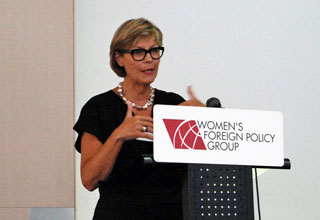 |
 |
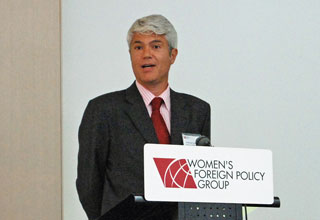 |
Katharina Zellweger speaks
to WFPG members and guests
|
|
Deputy Chief of Mission Guillaume Scheurer
of Switzerland welcomes guests
|
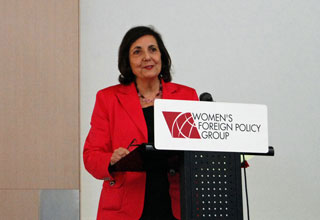 |
 |
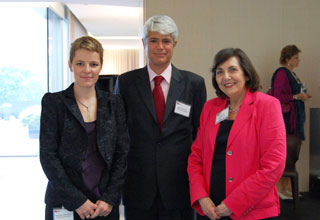 |
WFPG President Patricia Ellis opens the program
|
|
Anne-Lise Cattin Hennin,
Guillaume Scheurer, and Patricia Ellis
|
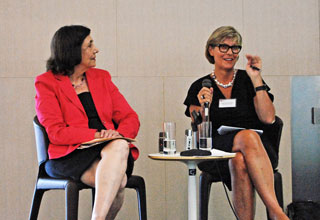 |
 |
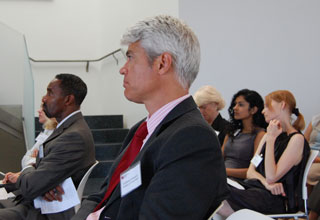 |
Katharina Zellweger responds
to a question from the audience
|
|
Guillaume Scheurer listens to the program
|
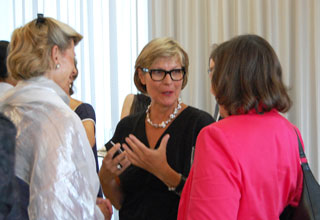 |
 |
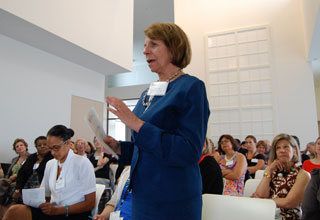 |
Board Member Diana Negroponte,
Katharina Zellweger, and Patricia Ellis
|
|
Participant asks a question during Q&A
|
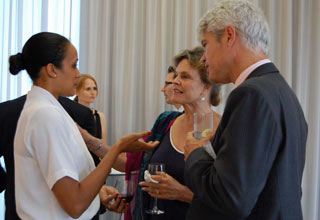 |
 |
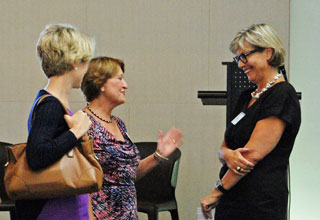 |
| |
|
|
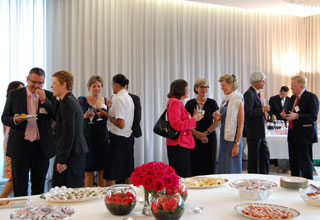 |
 |
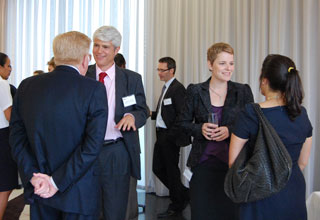 |
| |
| |
|